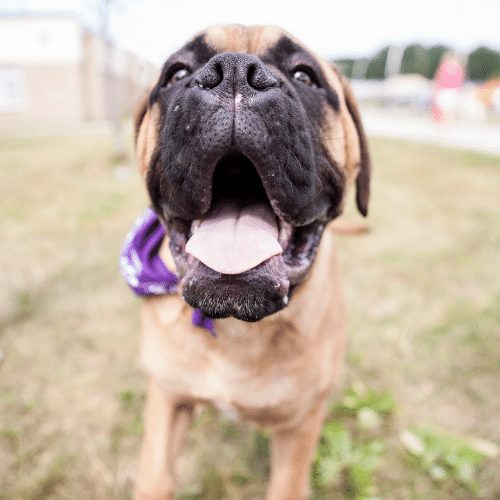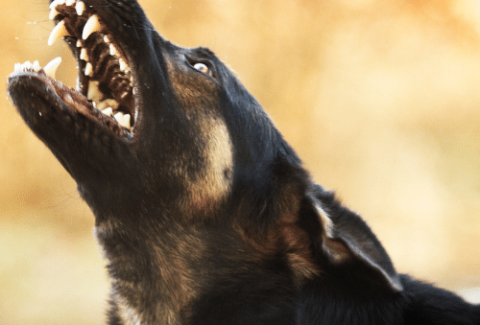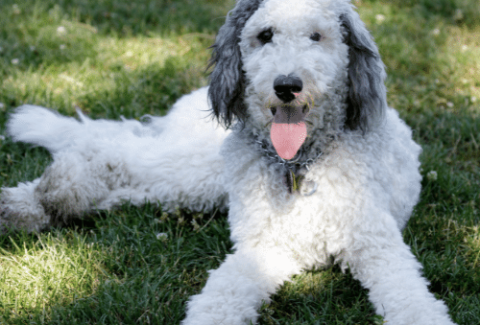How long do Mastiffs live?
February 24, 2021 2021-06-07 13:33How long do Mastiffs live?
Mastiffs are beautiful and loyal companions as well as excellent watch and guard dogs. Many families decide on a Mastiff puppy due to the size and temperament of the breed. But how long do Mastiffs live? What is a typical lifespan?
Generally speaking, most Mastiffs live to be 6-12 years. This is quite a big time span – which age your Mastiff specifically will reach will depend on a number of factors. Below we will look at the most important ones.
Table of Contents
How long will my Mastiff live?
Unless your Mastiff suffers an unfortunate accident or injury, he will most likely die of old age or cancer. Sadly, many large and giants breeds are prone to developing terminal illness at a relatively young age.
Tall dog, short lifespan
Across all breeds of dogs it holds true that the larger the breed, the shorter the dog’s life expectancy is. Researchers found out that the main reason for this is that large dogs age faster. Their body experiences age-related decay at much earlier ages than smaller dogs.
In giant breeds, any dog over the age of 6 years is considered a senior, while small dogs can still be spry and youthful at 12+ years old!

What do Mastiffs die from?
By being an observant dog owner you can prevent a Mastiff’s untimely death. Here is what you have to watch out for:
Bone cancer
The most common cause of death in Mastiffs is osteosarcoma (bone cancer). While there is no way to safely prevent this disease, early detection and treatment can prolong your dog’s life by a lot. Watch out for:
- Swelling or lumps anywhere on your dog’s body
- Sudden limping or licking of a paw or leg
- Breathing difficulties
- Seizures
- Unsteady gait
If you notice any of these signs, have your dog seen by a vet as soon as possible. Early detection and treatment is crucial in prolonging your Mastiff’s lifespan!
If you lost your Mastiff to bone cancer or another condition, Crossing the Rainbow Bridge is a wonderful resource for preserving their memory.
Lymphosarcoma
Lymphosarcome is a cancer of the lymphocytes (a type of blood cell) and lymphoid tissues.
Unfortunately, Mastiffs commonly suffer from this disease. Without treatment most dogs pass away within 1-2 months. If you detect this disease early and treat it well however, over 80% of dogs go into remission and can continue to live a happy life.
Watch out for:
- Lethargy and loss of appetite
- Weight loss
- Enlarged lymph nodes
- Fevers
- Disinterest in everyday activities such as going for walks, playing or getting treats
As with bone cancer, early detection will give your Mastiff the best possible chance for successful treatment and a long and healthy life.

Car accidents
Over 1.2 million dogs die as a result of being hit by cars in the US each year. Nearly all of these deaths are avoidable by taking proper precautions.
- Your Mastiff should not be left unsupervised in an unfenced yard
- You should always walk your dog on a leash
- Your Mastiff should wear a collar and proper tags so that he can be quickly returned home should he escape
- You should invest time and effort into teaching your dog to not run away
Genetic predisposition
Some Mastiffs have a genetic predisposition to develop certain cancers or illnesses. Ideally you should ask your puppy’s breeder about the health of the parents and grandparents.
Do not make the mistake of getting a Mastiff for the lowest possible price – instead, purchase your puppy from a reputable breeder. This will greatly increase the chances that your dog will live a long and healthy life.
How old is the oldest Mastiff?
The oldest known Mastiff was a dog named Kush. He lived in Australia from 1994-2009. While this is a great age, it is unfortunately not representative for the breed.
Sadly, it is unusual for Mastiffs to live longer than 10-12 years.
Why do Mastiffs have a short lifespan?
As explained above: Mastiffs have such a short lifespan because they age faster than smaller dogs. In addition, the high incidence of cancers in this breed contributes to a comparably low life expectancy.
You can considerably increase your dog’s chances for a long and happy life by feeding high quality food and taking him to regular checkups at his vet.

The Bottom Line
Mastiffs live 6-12 years. These dogs are sadly prone to developing lymphoma and bone cancer. Regular preventative vet visits are key to increasing their lifespan.
A healthy, high-quality diet will keep your dog in good shape and prevent the early onset of arthritis or diabetes. An ounce of prevention is worth a pound of cure when it comes to your Mastiff’s health.
Steffi Trott
Related Posts
Are Labradoodles High-Maintenance?
At what age do Labradoodles calm down?
Are Pomeranians Good for First-Time Dog Owners?
Are German Shepherds Hypoallergenic?
Are German Shepherds Smart?
Are German Shepherds Vocal?
Are German Shepherds Good With Kids?
Do Bernedoodles like Water?
Do Bernedoodles Like Cats?
How Long Can Australian Shepherds Be Left Alone?
Check out our effective and affordable online dog training courses!
-
Sale Product on sale
 Tackling Reactivity Bundle
Tackling Reactivity Bundle
MONEY BACK GUARANTEE$564.00$49.00 -
Sale Product on sale
 Perfect Obedience Bundle
Perfect Obedience Bundle
MONEY BACK GUARANTEE$349.00$49.00 -
Sale Product on sale
 Ultimate Puppy Bundle
Ultimate Puppy Bundle
MONEY BACK GUARANTEE$416.00$49.00 -
Sale Product on sale
 The Perfect Focus Bundle
The Perfect Focus Bundle
MONEY BACK GUARANTEE$445.00$169.00 -
Sale Product on sale
 Ultimate Masterclass Bundle
Ultimate Masterclass Bundle
MONEY BACK GUARANTEE$2,213.00$499.00











